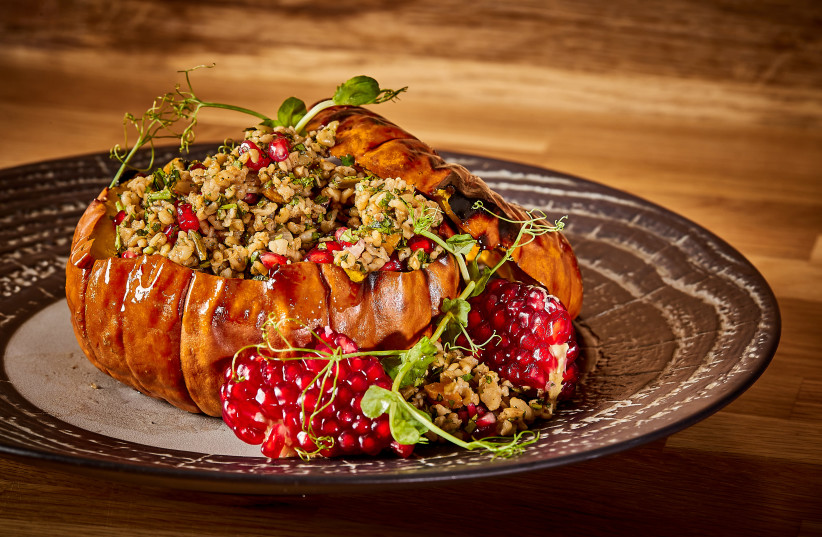Does Turkey taste better with hummus? I guess I’m about to find out.
Before we made aliyah from New Jersey, our Thanksgiving table was annually replete with the typical American trappings. Potatoes were mashed, cranberries were juiced, and gravy flowed like wine. Apple pies were consumed with a feverishness usually reserved for donuts before Passover. Fall flower arrangements festooned the dining room, and cousins showed up wearing turkey hats atop their kippot.
This year’s festivities will feel different. While Israel’s national holiday in November seems to be Election Day, November 24 will largely pass just like any other day. The local supermarket isn’t offering you a free frozen fowl if you spend NIS 300 in groceries. There won’t be hand-wringing op-eds in the papers over the propriety of celebrating pilgrims whose pieties seem so embarrassing amid our currently enlightened age. And if any football is being played by my kids that morning, it will be the European variety, at recess in school.
Then again, maybe trying to jibe Judaism with America’s day of gratitude is kind of what the holiday has been about all along.

Judaism and the story of Thanksgiving
As Nick Bunker notes in his Making Haste from Babylon, the Pilgrims carried to our shores a rather surprising companion – Maimonides. Or rather, his compendium of the Jewish law, the Mishneh Torah. Those Pilgrims were led by William Bradford, who would serve as governor of Plymouth Colony. Bradford, historical records show, carried with him an edition of the Bible published in 1618 that contained the annotations of a Puritan scholar named Henry Ainsworth. After their safe passage, Bradford led his fellow new arrivals in thanking God for their survival over the course of the journey by reciting verses from Psalm 107. The Bible he used to do so contained the following note, courtesy of Ainsworth:
“And from this Psalme, and this verse of it, the Hebrues have this Canon; Foure must confess (unto God) The sick, when he is healed; the prisoner when he is released out of bonds; they that goe down to sea, when they are come up (to land); and wayfaring men, when they are come to the inhabited land. And they must make confession before ten men, and two of them wise men, Psal. 107. 32. And the manner of confessing and blessing is thus; He standeth among them and blesseth the Lord, the King eternal, that bounteously rewardeth good things unto sinners, etc. Maimony in Misn. Treat. Of Blessings, chap. 10, sect. 8.”
Based on this summary of Maimonides’ legal articulation of birkat hagomel, the blessing recited by Jews to this day after they are saved from danger, Bradford saw his compatriots’ arrival in America as mirroring the Israelites’ journey through the wilderness to the Promised Land – one of the four conditions requiring “confession and blessing.” To Bunker, this prayer – verses from the Hebrew Bible, cited in accordance with the practice of Jewish law – constitutes the original Thanksgiving.
There were no Jews on the Mayflower, and only around 2,000 in the colonies during the American Revolution. But even in George Washington’s day, the Jewish story informed America’s articulation of its gratitude to God. In October 1781 (the day being marked in November was not formally instituted until President Abraham Lincoln proclaimed its celebration in 1863), British Gen. Charles Cornwallis surrendered to Gen. Washington. Addressing the battle-weary but victorious troops in Yorktown, Virginia, Rev. Israel Evans, one of Washington’s favorite military chaplains, delivered a Thanksgiving sermon in which he, too, saw the safety and success of the nascent nation through an Israelite lens. The poem he recited as part of his sermon read:
To him who led in ancient days
The Hebrew tribes, your anthems raise;
The God who spoke from Sinai’s hill
Protects his chosen people still.
WHILE THE vast majority of American Jews have celebrated Thanksgiving as part of American civil religion over the subsequent two-and-a-half centuries, some rabbinic scholars hesitated to offer a full-throated embrace of the tradition. After all, while the United States proved to be a promised land for millions, the real Jewish national homeland lay to the east.
Thus the renowned rabbinic scholar Rabbi Moshe Feinstein offered no less than four responsa analyzing the permissibility of Jews observing Thanksgiving, eventually concluding it is a simhat reshut, an optional, albeit nonobligatory, festive celebration. Rabbi Yitzchak Hutner took a more prohibitive stance, forbidding marking a holiday based on the Christian calendar. Rabbi Joseph Soloveitchik, on the other hand, is reported to have had a habit of beginning his regular weekly Talmud lecture early in order to travel to his sister’s in time for Thanksgiving dinner.
Talmudic debates aside, gratitude is, of course, inherent to the very essence of Judaism itself. The very word stems from the name Judah, one of Jacob’s sons, whom his mother named using the Hebrew word for “thanks” as a means of expressing her recognition of the blessings that God had bestowed upon her. Thus, my own Modern Orthodox community historically has maintained fidelity to our turkey feast, even among American expats like me.
So this year, during Thanksgiving dinner, you’ll find me sitting in Modi’in, hometown of a different small group of courageous individuals who risked life and limb for freedom. While we won’t light a candle for those guys for a few more weeks, in the meantime I’ll be raising a toast to the Pilgrims, and recite the appropriate blessing.
I won’t be reciting it on alcohol, though. I’ll be drinking coffee. With the seven-hour time difference, the Giants-Cowboys game starts close to midnight.
The writer is senior adviser to the provost and deputy director of the Straus Center for Torah and Western Thought at Yeshiva University. Among his edited books are Proclaim Liberty Throughout the Land: The Hebrew Bible in the United States and Esther in America.
